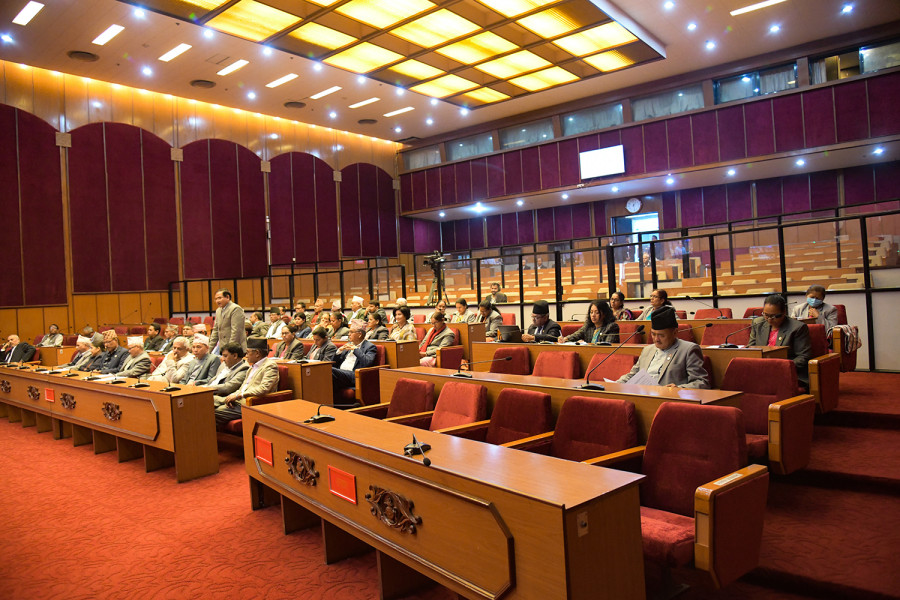National
House panel endorses bill allowing intelligence agency to listen in on conversations
The bill passed with the support of the opposition Nepali Congress, despite legal experts sounding the alarm over its potential for misuse and privacy violations.
Binod Ghimire
The federal parliament is readying to pass an amendment to the Special Service Act but privacy activists and legal experts are concerned that the bill allows the government to trade the privacy of citizens away for security concerns.
The bill to amend the Special Service Act was registered in the National Assembly late last year, despite opposition from the Nepali Congress. It was then under deliberation at the Legislation Management Committee of the Assembly, which endorsed the bill unanimously on Thursday. The amendment bill allows intelligence officials to listen in on conversations of “suspects” without a court order.
The Congress party had earlier opposed the bill on the grounds that a court order should be mandatory for intercepting conversations. But it has now backtracked and supported the bill, clearing the way for its passage from both houses of parliament.
The Congress party, however, defended its decision to support the bill, saying it ceded its earlier stance after the ruling party agreed to incorporate some measures that could check the misuse of authority.
Prakash Pantha, a Nepali Congress member of the committee, said that the party had supported the bill after the government and the ruling party assured that the measures would be put in place to prevent its misuse.
According to Parshu Ram Meghi Gurung, chairperson of the committee from the ruling Nepal Communist Party, the bill now includes a provision of a seven-year jail term for any officials who misuse their authority and listen in on conversations at the individual and institutional levels without justification.
“The bill now has a safeguard against its misuse by state authorities,” Gurung told the Post. “I don’t think the general public needs to fear it.”
But legal experts remain unconvinced. Allowing intelligence officials to intercept conversations without a court order is a sure path to misuse, they say.
“Are we trying to turn our country into a police state?” Sher Bahadur KC, former president of the Nepal Bar Association, told the Post. “This bill will assist the government in taking an autocratic path and the main opposition Nepali Congress has supported it.”
Drafted by the Prime Minister’s Office, the bill says that it has become necessary to control acts of “secession, espionage, sabotage and subversion” and “protect national sovereignty, national integrity and communal harmony”. The bill envisions a specialised office for intelligence gathering under the National Investigation Department and the formation of a nine-member committee led by the prime minister to draft the necessary policy, coordinate and provide guidance.
The provision in the bill requires the chief of the intelligence unit to make a decision in writing to intercept conversations, which will only be used to counter threats to national security, sovereignty and integrity, according to the government. The recording, however, cannot be presented as evidence in a court of law.
Bipin Adhikari, former dean at the Kathmandu University School of Law, believes that as the state machinery is corrupt, the provision of phone tapping could always be misused.
“The range of offences against which these provisions are to be applied must be limited, which is not the case now,” said Adhikari.
The government’s unwillingness to include the requirement of a judge’s consent is already dangerous, he said.
According to Pantha, the Congress member in the committee, his party agreed to support the bill after it was revised.
“The revised bill is a document of compromise,” Pantha told the Post. He, however, admitted that it would have gone through the legislation committee anyway, as the ruling party commands a majority.
In the 14-member legislative committee, 10 are from the ruling Nepal Communist Party (NCP), two from the Nepali Congress and one each from the Rastriya Janata Party Nepal and the Samajbadi Party Nepal.
But KC, the former president of Nepal Bar Association, said the bill was designed by people with an autocratic mindset.
Ever since its formation, the KP Sharma Oli administration has received flak for trying to shrink civic space, curb freedom of speech, control press freedom and trample upon civil liberties.
Experts have long questioned the Oli administration’s motives as well as the main opposition’s ineffective role in putting a check on the government’s actions. They say the amendment is yet another part of a series of laws that the Oli administration wants to introduce to control public behaviour.
The bill, registered on December 15, was tabled for discussion a day after a House panel endorsed the controversial Information Technology Bill, which experts fear could curtail freedom of expression and increase surveillance over personal data.
Gurung, however, defended Thursday's decision to endorse the bill by the legislation committee, saying they had held intensive discussions before finalising it.
“We had as many as 12 meetings among lawmakers and with experts,” Gurung told the Post. “We have evaluated every aspect of the bill.”
Experts say the Congress decision to support the bill not only indicates that it is a weak opposition but it also emboldens the Oli government, which appears ready to take heavy-handed decisions with its numerical strength in Parliament.
“I urge the lawmakers to wake up and reject the bill at the National Assembly itself,” said KC.
Tika R Pradhan contributed reporting.




 9.7°C Kathmandu
9.7°C Kathmandu














